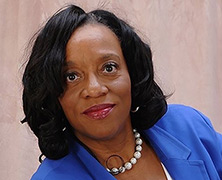Gender and Racial Bias Merge to Impact Women of Color
Imagine being the only woman in a room full of men. No matter how hard they try not to make judgments based on gender, their minds are immediately flooded with deeply ingrained implicit biases. Now, imagine yourself as a woman of color in that same situation. We’re no longer talking about a flood of biases. It’s been upgraded to a full-on tsunami!
This scenario has played out many times throughout my career. When I walk into a room, people don’t see my 20-plus years as an accounting professional with Ernst & Young, Nationwide, and Lincoln Financial Group, where I currently serve as senior vice president and chief audit executive. Nor do they see me as a veteran, despite the 14 years I spent in the U.S. Navy Reserve. They see me as a woman…a Black woman.
This intersection of racial and gender stereotypes clearly impacts how women of color are viewed in the workplace. While a determined white woman is perceived as assertive, a determined black woman is branded aggressive. Most concerningly, our true worth often goes unrecognized, resulting in a dearth of women of color in the senior management ranks.
I’m not suggesting our destinies have been predetermined by our gender, compounded by the color of our skin. While we’re clearly fighting some powerful headwinds, the ultimate determinant of success (or failure) lies within each one of us. Granted, employers have an important role to play in laying a framework and holding people accountable, but it’s up to us to chart our own path to success. That begins with bringing our authentic selves to work. As a young woman, that would have terrified me, but as I’ve progressed in my career, I’ve become more comfortable voicing my opinions. You’d be surprised how many times brainstorming sessions have been punctuated with, “Wow, we hadn’t thought of that,” in response to ideas informed by my unique experience.
I’m fortunate to work for a company that takes its commitment to diversity and inclusion seriously, which encourages the involvement of employees at every level. At Lincoln, support of D&I begins at the very top, but bottom-to-top initiatives are just as important in helping to advance those principles. Personally, I am proud of the diverse workforce I have cultivated within Finance, as well as my participation in Town Hall and Leadership panel discussions on issues surrounding race, and why silence is the enemy of advancement.
As women of color, we have to work harder to prove ourselves, but there’s nothing inherently holding us back. By focusing on our diversity as an asset, sharing our unique perspective, and speaking with our true voice, there’s no mountain too high for us to climb.







